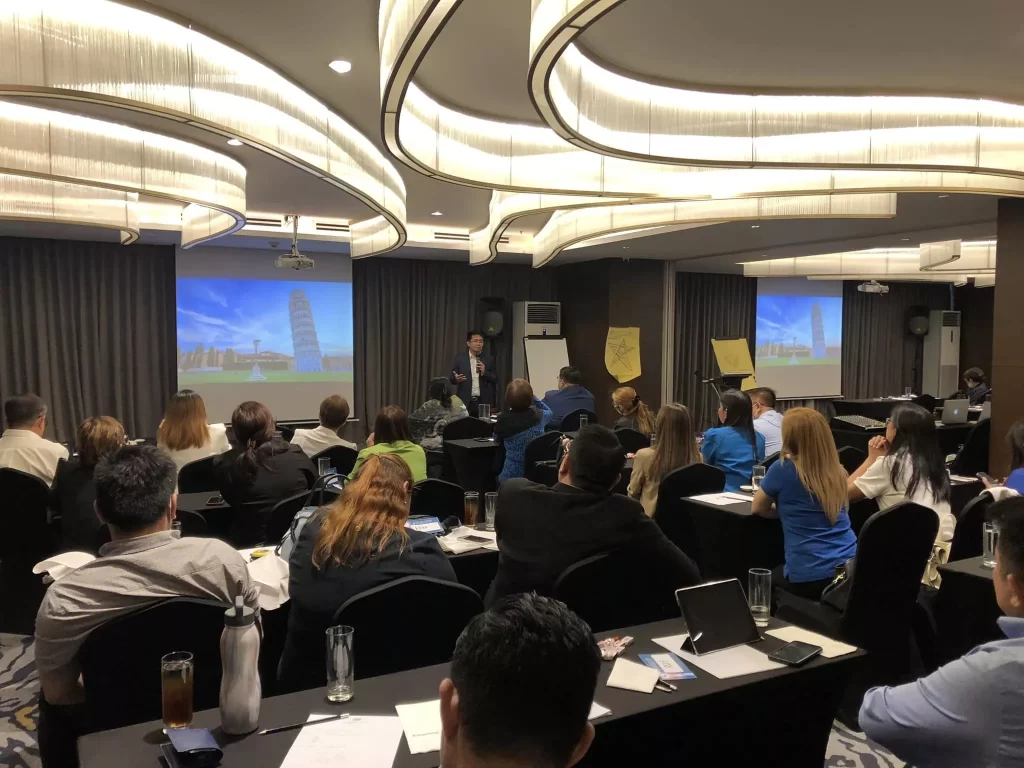by Venchito Tampon | Last Updated on September 28, 2023
I’ve spoken to more than 250+ seminars, conventions, and conferences. As a public speaker, I made tough mistakes, learned from them, and achieved significant wins.

Most people fear public speaking, but confidence can change your speech. Here are some practical tips from my decade of public speaking experience.
How to Be Confident in Public Speaking
1. Practice, practice, practice.
Practice doesn’t make things perfect. Practice makes permanent.
When you practice, it gives you an initial boost of confidence in speaking. Knowing that you are prepared enough for the right things allows you to remember words and pictures while talking.
When you constantly practice your speech, you develop what professional speakers called as “muscle memory”. Muscle memory happens when you can instantly remember and speak what you know without looking at your cues (or slides).
This gives your audience an exciting side: you know what you’re talking about and are genuinely confident in your speech.
2. Know that your audience wants you to win.
Instead of thinking that you will stutter, fail, or not fully deliver your talk, remember that, in the first place, your audience wants you to win.
The organizer who gets you to speak and your audience desires explicitly to learn more from you. They expect nothing from the best of you – and that shouldn’t add up to negative pressure, but rather, an excitement that you can transform their lives one way or another through your speech.
One of the best things I’ve learned in public speaking is that my audience has an inherent desire to learn (or be entertained). Though, for the most part, some of the seminars they’ve attended have failed to meet their expectations.
They’re still looking (and waiting) for that time that one speech could help improve their lives. And that could be you if you think they’re working with you, not against you.
3. Speak what you know.
Confidence comes from speaking what you know.
Some speakers would confirm to speak even if they don’t have any experience on the topic. Experience (and even expertise) allows speakers to be more confident in their words.
Remember: conviction gives a force for every word you utter. Therefore, the speech becomes more confident as it sounds to your audience.
Speak based on your personal experiences. Share your stories. Be more human to your audience, as they can relate better to it than discussing facts, numbers, and theories throughout your presentation.
As you prepare your speech, consider any relevant life stories you can share to emphasize your points.
4. Remember you have something good to say.
When you speak what you know, remind yourself that it suits others.
Always be confident that what you say will benefit the audience listening to you. Some of them may not be truly listening, but for those genuinely hearing your words, you could significantly impact their lives with that 30-minute to 1-hour speech.
One tip to build confidence in your speech is to bank new information and learn by reading more books, listening to podcasts, and attending seminars.
Through this, you know that the accumulation of all this knowledge will put into any relevant part of your speech.
5. Make eye-to-eye contact.
One public speaking best practice is making eye-to-eye contact.
Having eye-to-eye contact with people in your audience develops the right confidence. Your participants would see you’re starting to build rapport with your eyes.
Remember, your eye is the window to your soul. Your positivity and excitement will be passed on to them just by simply making eye-to-eye contact.
6. Connect with your audience at the start.
Building rapport isn’t easy, but it can be practiced.
You should establish a connection with your audience in the first few minutes of your talk.

Briefly introduce yourself, and quickly share something that can relate to your audience.
Here are a few actionable tips for connecting with your audience:
- Smile. The best way to break barriers from your audience is to smile at them. It reveals authenticity and joy towards your people.
- Share relevant stories. We want more stories than facts/theories. Stories that can emphasize your points are best, as they allow for information to be retained in the minds of your participants.
- Add some humor. Make people laugh by sharing a joke or witty information.
Connection is the key to communication. The more effortless for you to connect to your audience, the better you can share your information (also helps in retaining the information).
7. Make your talk collapsible and expandable.
Speech has different time durations. The organizer may ask you to speak for just 30 minutes. Other events could take you 3 to 4 hours.
The duration of your speech depends on the objectives of the event. So, learning how to make your talk collapsible – making it shorter than the usual time allotted, or expandable – making it longer by adding more points and information.
Making your talk collapsible and expandable is an advanced public speaking skill I’ve learned from one of my mentors, Jayson Lo, a top-ranked corporate speaker in the Philippines.
It is a game-changer for any speaker to control their speech, knowing they can do it in 10 minutes or 2 hours. Doing so gives them more confidence in public speaking.
8. Use the Big 3 Rule.
Determining your main three points (“Big 3 Rule”) is the key to making it expandable and collapsible.
Often, speakers want to overload their audience with too much information, examples, and stories. But generally, you only want to speak with clarity and brevity.
The simpler your speech is, the better. Using the Big 3 Rule allows you to avoid the curse of knowledge and makes speech more memorable to your audience.
Here are some practical tips when using the Big 3 Rule:
- Think of 3 things you want your audience to remember about your topic.
- Avoid using jargon. Simplify your words.
- Make points actionable so your participants can apply them immediately to their work and personal lives.
- Start your talk with your one big idea followed by the main 3 points, then end it with your one big idea again.
9. Record your speech.
Part of practicing your speech is watching what you say and how you say it. You do that by recording yourself during practice.
When you record your speech, you could take several minutes to give feedback on yourself or even ask others to suggest new things you can improve.
The key is to be more self-aware of your strengths and weaknesses in public speaking.
Essentially, you want to maximize public speaking strategies that have worked incredibly for you and avoid or minimize the weaknesses – and mistakes that would turn off your audience and make them leave the venue.
Recording your speech in practice and speaking engagements helps you get more feedback and evaluate your experiences.
10. Arrive early for your speech.
The last thing you want to do is to be in a hurry that your audience pisses off because you’re late in your speech.
Being early at the venue gives you initial confidence as you can see exactly what the venue looks like when you walk on stage (specific parts of the stage you can use to emphasize your points). At the same time, get a feel of the atmosphere when the audience is around.
Relax. And feel the mood before you speak.
You can also use the early hours to engage your audience – talk to them and ask questions about their expectations from the event. This allows you to customize your speech to exceed their expectations while serving their needs through the points and information you will share.
10. Relax when things go wrong.
There are uncertainties you cannot control while doing your speech.
You may only know some of these once you start talking. Things like power interruption, a few audiences coming in the event, technical issues with your slide presentation, or as simple as you don’t have a stage to step on.
These things are uncontrollable or could be solved when you ask for help from organizers. But the thing is, you’ve got to relax when things go wrong.
Your audience would feel you’re awry, nervous, and uneasy. And this might affect how they would perceive you as a speaker.
So relax. And start your speech. Your audience knows only some speeches will be perfect. But if they see you do your best to deliver it properly and serve them genuinely, they would appreciate you coming over and speaking to them.
Key Takeaways
Being confident in public speaking comes from the inside. If you know your worth and have something good to say, you don’t have to worry about what others will tell you (others’ judgment) and continue speaking.
You’ll be amazed at how transformative your speaking engagement is just by being confident.
The Author
Venchito Tampon
Venchito Tampon is a Filipino motivational speaker and Corporate Trainer of Rainmakers Training Consultancy. He trained and spoken in over 250+ conventions, seminars, and workshops across the Philippines and internationally including Singapore, Slovakia, and Australia. He has worked with top corporations including SM Hypermarket, Shell, and National Bookstore.
He also founded SharpRocket, a digital marketing company, Blend N Sips, eCommerce for coffee supplies, and Hills & Valleys Cafe, a local cafe with available franchising.


